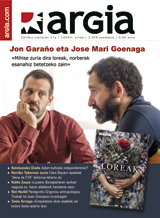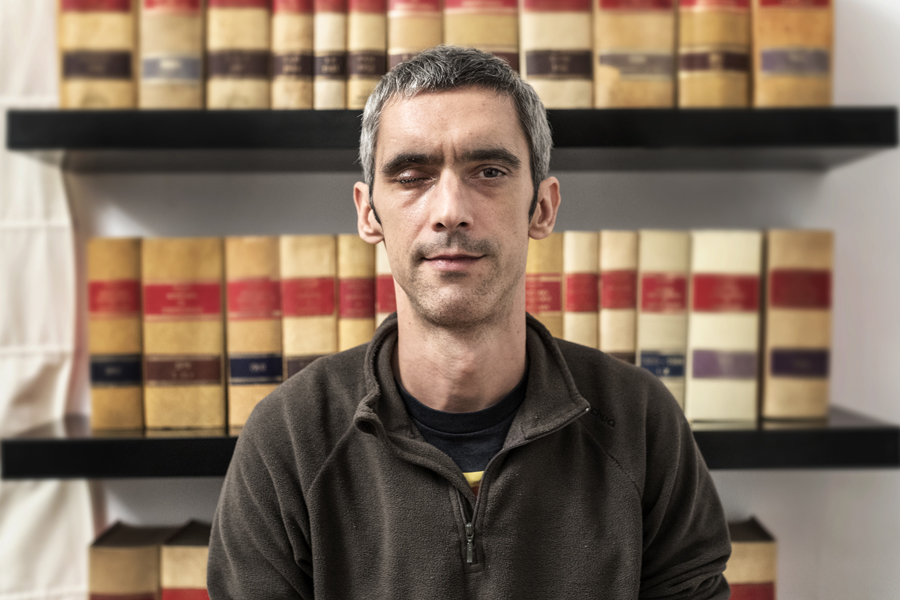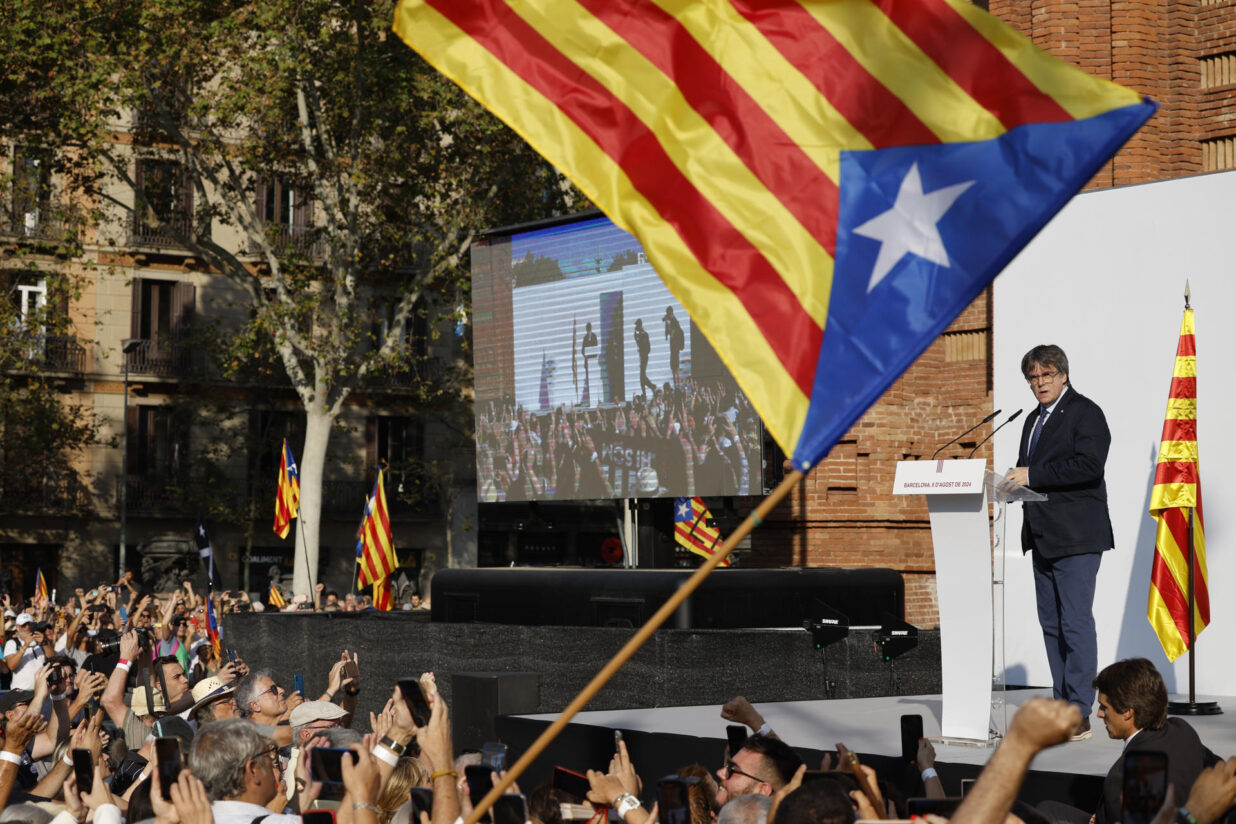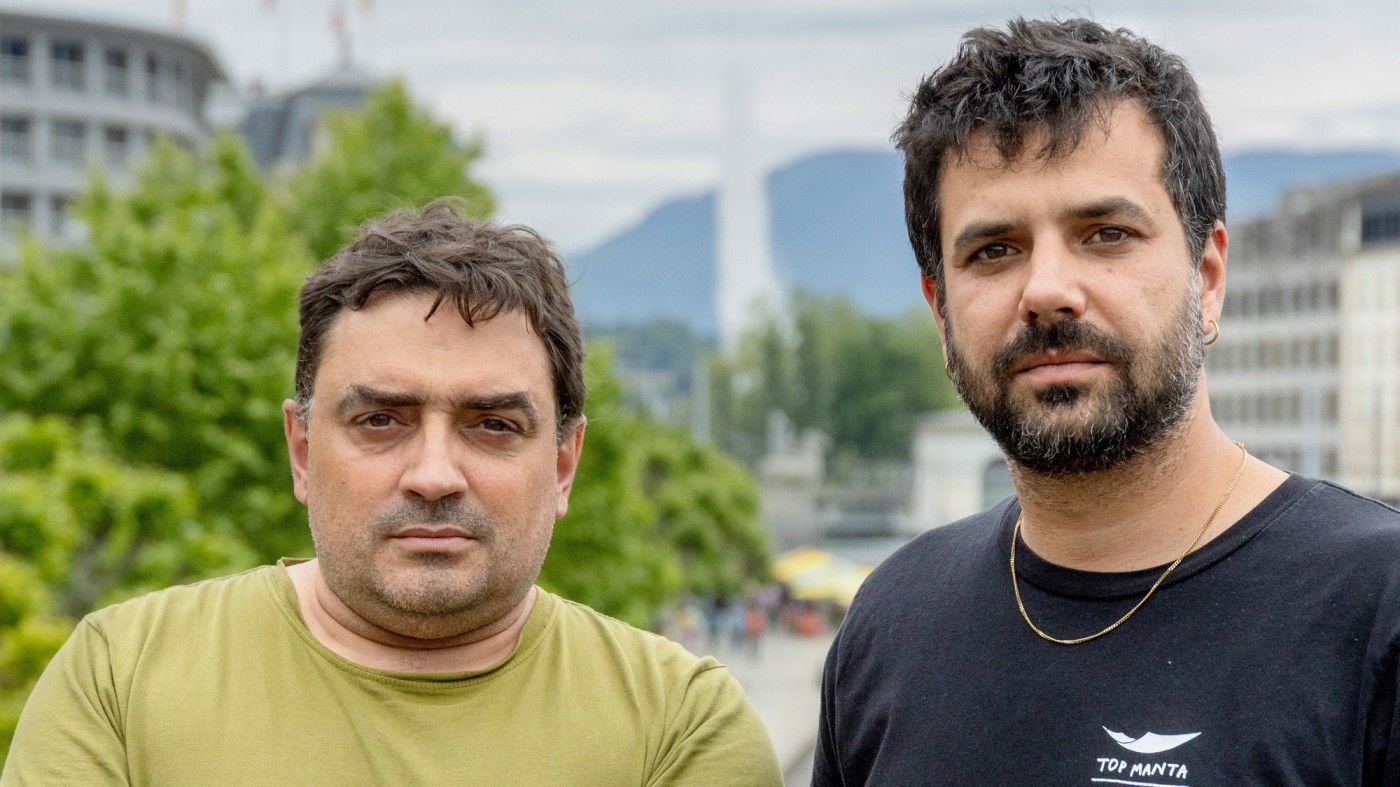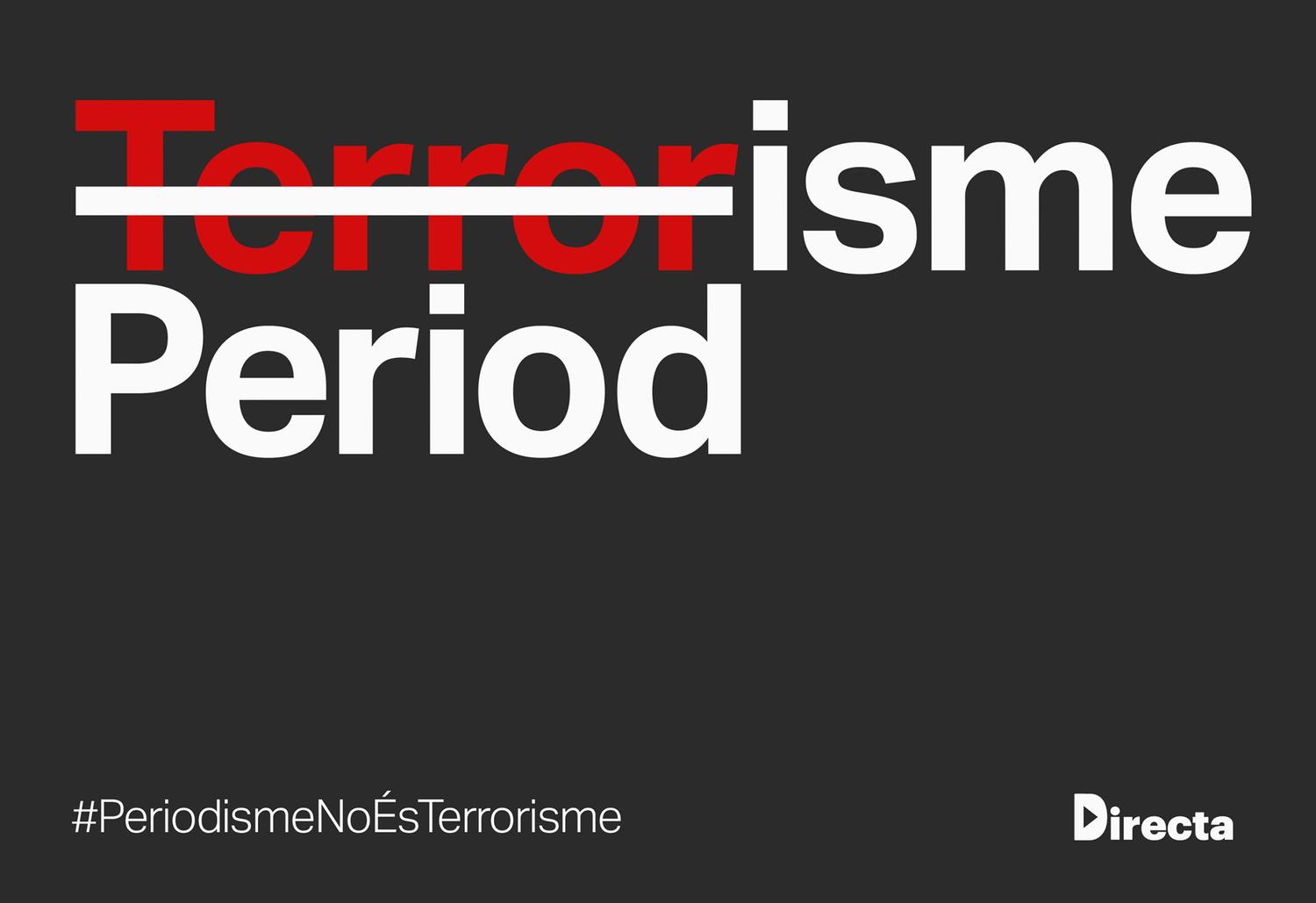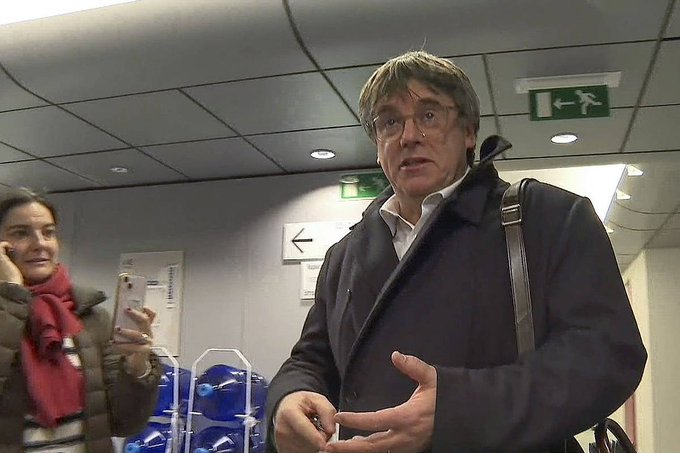Interrogation in the air
- You already know that on September 11 a crowd has gathered in Barcelona that has broken all records and what it has asked: On 9 November it means yes or no to the independence of Catalonia. You might want to know what you're breathing in the village of Estelad to make the subject so hot. We explain it to you through those who follow the process closely.
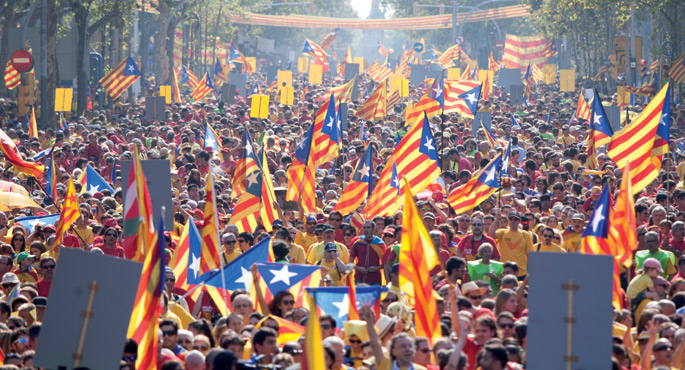
That kid who has tied the independence flag to the neck and become the super hero layer, has stood on Gran Vía to look at who knows what. Later on, the man who kept walking with a woman and another child, father, if possible, of the distracted child, regressed. It seems older than its age, a two-day white beard tip, the front hairs glued by sweat – this Barcelona moisture also boils down to those of the Mediterranean species. Don’t waste your time on two questions: he grabs his arm and takes an annoying “aneeeem” to the small walking Star who complains. The central event of the Diada has ended half an hour ago in the Plaza de las Glòries in Barcelona. The giant letter “V”, the biggest manifestation in the history of Catalonia, the people, the people, the people and the people, is slowly dispersing in the night that the Instagram filter has put on it.
The day has been long. It has served to greet old friends, to drink, to sing, to dance, to wave with thousands more people. And to get tired. Political mobilizations don't tell you that: The flashmob that has collapsed the arteries of Barcelona, for example, has demanded small sacrifices from ordinary Catalan.
Get up before what doctors advise for holidays, start preparing the turtles, where the albal paper is to pick up the snack, we'll be late, you'll see it; convince the child to wear the yellow t-shirt today and not Spiderman's; and come to the city, look for the space that has touched you and, in the meantime, see if we don't lose ourselves, here? And now? Oh, don't move! With this sun? All right. This is a crowd, the mare that he's going to give up.
We will save our Catalan the long time that has passed from noon to almost eight in the afternoon to go directly to the end: the time has come to return home and his patience thinks he has passed this test, the couch of house has already been put on the buttocks and when the holy rest is close, what are you going to do? He was staring at the moon. Ostres, it makes you hard. It is no bad thing that this was the last time.
What -- it was the last one, right? After that, on 9 November, we will have the consultation, right? This has been announced in the ANC’s Carme Forcadell central stage, which has called for the demonstration. He and many others. If every time he heard the words “votarem” and “guanyarem” he would have taken a sip of the liquor he was wearing on his face, a journalist who has come to find out about the Diada – fortunately, he has taken the recommendation not to politicize drinking games seriously – would have ended the day wobbling.
Brief institutional appearance of Artur Mas for dinner: “A people cannot be prevented from voting if they want to vote.” Some expressions are firmer, some are more temperate, but all point in the same direction. The consultation on independence is the north for this mass that is in a position to make a full alphabet. But everything else is in the air. But he has met with the "V" callers on the same day 11 and has not clarified whether he is going to take out the ballot papers. Double message for the Govern. That of home, which will work to maintain the unity of the parties proconsults; that of Madrid, which will ask Rajoy to negotiate the terms of the consultation.
The law on consultations in Parlament will be adopted on 19 January and, not to turn off television, the most fun scenes will now happen.
Independence, by the failure of the parties
Close to Plaza de Sant Jaume is the caste cafeteria that challenges the time with marble tables. A white shirt waiter pronounces the rubber “L” when asking what we want. There we found Enric Rimbau. For many years he has worked in the weekly El Temps, a Catalan cousin of Light, writing about politics and living with passion the process. He is aware of this, because he mentioned many more extremes than we had prepared for the first answer: in his view, CIU will not be easy to approach the issue in terms of its interests. In August many wagered that it would be choked, but the Diada crowd pushes it hard, there is no turning back.
“There has been a paradigm shift in Catalan politics, autonomism has shifted to the shore and independence has become the backbone. We have seen the failure of Catalanism, it has been repeated twice the tripartite government [PSC-ERC-ICV] and CiU tried to put them in contradiction with the flag of nationalism; then everything that happened with the reform of the Statute… has been a long process until we reach this point”.
“It was a mere porn,” said Salvador Cot, director of the website Nace Digital. In the drafting of the Passeig de Gracia has begun to speak of the collection of betrayals and maneuvers of the negotiation of the Statut. In the expensive restaurants of Madrid the Catalan political framework was played, where eating the full menu is easier than learning the names of the dishes. Since 1978, the two main parties of the former regime, CIU and PSC, have had a very keen style: the private agreement and the triptych first, then the public explanations. It worked for years, why not now?
By then, many symptoms say the citizen has already begun to wobble. It has lost confidence with the political representatives. And, let's say it as a children's story, there was once a village called Arenys de Munt, ready to organize a referendum on independence. It is apparently something for the self-consumption of those who have always joined this cause, but it produces noise. Then other people come to town. And every consultation is not just a symbolic questionnaire: these are talks that are organized in the environment, people with a new theme for the talk show, people who never moved to join. Rimbau summarizes how the process started: “The mobilizations surpassed the parties and in each Diada they have given new impetus to the political class.”
The rich also have their own process.
“All these people didn’t fit in a restaurant in Madrid,” says Cote, pointing to the front page of a 12th newspaper that is about to burst from Estelada. This is the advantage of starting from citizen dynamics, and not from political leaders: “The ANC is not obliged to negotiate, it does not need to agree as the parties do.” And it has the ability to take thousands of people out into the street, with the credibility that the parties, upon reaching this part of the movie, would never get.
We have interrupted the conversation by the call of the Valencia correspondent. When he comes back to the issue, he talks about the weakness of the Catalan economic elites: “This process shows that they have no capacity to influence. Otherwise, they would manage to stop him. In Madrid, for example, they would get some offer, something similar to the Economic Concert. And that would paralyze the process for a generation.”
Bored to see the empty window, the class authority has decided not to wait for the opening of the Moncloa. “The elites here have moved towards independence because they have run out of resources.” But look, because Rimbau feels it is necessary to specify what we are talking about when we talk about elites: “It’s not the same a big company, close to the centers of power, with a status quo as a means of living; or a small entrepreneur who has a work team. Among these small and medium-sized, independence has grown a lot.”
And the other one what? As Cot says, things are also happening in the plans of the big coins: Surveys that considered the real possibility that Scotland would say “yes” in the referendum have led to the Spanish debt being reduced by around ten points in the week of the Diada. “At the beginning of its process, London gave its assurance: If Scotland leaves, they will pay as much debt as they have. However, Wall Street sharks do not believe that Spain is capable of doing the same without Catalonia.”
Therefore, and to put it more squarely, the Spanish debt is weak in the markets. “A stock exchange expert said he had recommended his clients to sell that and buy Italian at Bloomberg and the Wall Street Journal.” In the face of the multitude of the Diada, the soldiers' teeth sweat with the business of a bullfighter who cannot afford the suit. The yes of Scotland can introduce new elements into the game, beyond the agents of Spain or Catalonia.
Still in the parameters of the old policy
“My point of view is very minority,” warns us Guillem Martínez, just sitting on the terrace of Casa Delfín, next to Born. We already know that. It is the hangover of the Diada – in every sense of the word – and we have just seen the centre of Barcelona turned into Port Aventura Secessionista. We are also aware that this something indepe greatly inflates our readers, so we ended the report with a “ice bucket challenge”.
This journalist and writer, who knows some irony, believes that the Catalan process is so great, that it escapes its meaning: it is the end of a regime and at the same time its defense, everything is contradictory. “Catalonia is a country for professionals. I mean, you have to be a professional to understand this, it's very rare." And from there, according to him, part all the salsa: "The Government of Spain did not understand that CIU, once again, called for the usual. Negotiate just a few things, staging dramas, of course, and small solutions to those dramas. It has been thought that the wager was serious and will have catastrophic consequences for both Spain and the CIU. The two may disappear at the end.”
As propaganda he described the pact between Convergència and ERC, the spectacle, to entertain the citizens with the clash between two governments, while brutal democratic cuts are being made. “When the referendum is not held on 9 November, because the Spanish Government refuses for absolutely undemocratic reasons and the Generalitat has no special interest, a new propaganda operation will have to be invented.”
Martínez mainly observes the elements of “old politics” in the ongoing process. “And a new policy will be manifested through the right to decide, but also through many other rights. And there is no interest on the part of those who are managing this, outside the CUP, to make this revolution democratic. The management of territoriality is a unique issue for the parties, the only one that has been approved in the Spanish culture of the last 30 years. I think they haven’t even realized that the framework has been broken.”
Near Jaume I Metro Station we say goodbye to Martinez, put the helmets in the ears and approach a kiosk, informing us of the historical mobilization and interviewing El Punt Avuin, Joseba Sarrionandia, on September 12, which can be a good reading for the return trip. “Quedem the 9-N” says on the cover. Less than two months for the referendum day. Time will dilate in that interval, decisions will be speeded up, they will be speeded up, Catalonia enters a phase in which every minute is important. The random option of MP3 has also understood the situation and recalled the fundamental question of this case, with the help of The Clash: “Should I go or stay? If I go, it will be an altercation and if I stay, the double problem.”
Zerbaiten bukaera izan da Diada hau ala zerbaiten hasiera?
Ziklo bat bukatzen dela begi bistakoa da. Orain gatazka fase batean sartuko gara erakundeen artean, baita arlo juridikoan ere. Zoritxarrez hau ez Eskozia eta ez da izango. Espainiako Estatuak uko egin dio konponbideari, beraz bide kataluniarra, zoritxarrez, bide eskoziarraren aldean diferentea izango da. Presio soziala eta ehundura asoziatiboaren eragina garrantzitsuak izango dira oraindik.
Baina, goia jo al du mobilizazioak?
Gizarte bat hainbeste mobilizatzen denean leher eginda buka dezake, egia da. Zerbait gertatzeko momentua da, zerbait ukigarria; baina era berean, “ez dago atsedenik nekatuentzat”, hemengo idazle batek zioenez. Kataluniako mugimenduak ez dauka Europan parekorik gaur egun eta oso dinamikoa da, oso soziala. Behetik gora egin da prozesua.
CiUk atzera egingo duela zirudien abuztuan. Zuek desobeditu eta azaroaren 9an hautestontziak ateratzearen alde zaudete.
Eztabaida ez da Espainiako Estatuak zer egingo duen, hori argi dago: kontsulta debekatuko du. Garrantzitsuena da nola erantzungo diogun herri gisa. Guk argi daukagu desobedientzia zibilaren aldeko apustua. Subjektu politiko burujabea bagara, lehenbiziko burujabetza ekintza hautestontziak jartzea da Kataluniako gizarteari obedituz –aukeratu behar badugu tribunal bati ala herriari obeditu, guk herria aukeratzen dugu–. Ikusi beharko da zein irtenbide amankomun bilatzen dugun, argi baitago CiUk buruan daukan eszenarioa ordezko-hauteskundeak direla, hau da, plebiszitarioak.
Zein da CUPek lehenesten duen bidea?
Zilegitasun demokratiko handiena erreferendumak ematen dizu. Gure eskema da, lehenbizi erreferenduma eta bi baiezkoek irabazten badute, prozesu konstituziogilea. Eta ondoren negoziazio fase bat, nazioarteko eskematan.
Eta hurrengo fasea behar bezala landuta dago?
Eztabaidak asko egin du aurrera: jendea planteatzen ari da nolako eskola publikoa nahi duen, nolako osasungintza, lan harremanak, ondare natural eta artistikoa nola babestu… Hori da prozesuaren alderdirik interesgarriena nire ustez, eredu berri baten oinarriak jar daitezkeelako. 1978an batzuk jarri ziren, iruzur hutsa, eta orain beste batzuk jarriko ditugu demokrazia berrasmatzeko.
Abuztua nola joan den ikusita, galdeketaren alde zaudeten alderdien kontsentsua apurtzeko arriskurik ba al dago?
Ez da kontu berria, CiUrekin egonkortasun parlamentariorako paktua sinatu genuenetik zailtasun handiak izan ditugu. Logikoa dela uste dut, bi alderdiak oso diferenteak garelako. Batzuetan ezinezkoa izan den arren, kontsentsuak lortzeko lan handia egin dugu, elkarrekin eutsi diogu, ulertzen dugulako gainetik dagoela kataluniarrek bozkatu ahal izatea.
Desadostasunak badira, beraz.
Bai, baina konbentzituta nago gaindituko ditugula. Akordioa oraindik indarrean dago eta hori da garrantzitsuena.
Masen gobernuak hauteskunde plebiszitarioak deitzeko keinua egingo balu, zer?
Uste dugu gobernuak ezin duela horrelako keinurik egin bere kabuz. Hitz egin beharko genuke aurretik. Gure mandatu demokratikoa zein den argi dugu eta ez da herritarrek hauteskundeetan bozkatzea, gure herrialdearen etorkizuna erabakitzea baizik; eta hori lortzeko modu bakarra erabakitzeko eskubidea praktikan jartzea da. Horren bila joan behar dugu amaierara arte, fisikoki hautestontziak eskuetatik kentzen dizkiguten arte.
“B plan” gisa ez duzue buruan CiUrekin batera aurkeztuko zinateketen hautagaitza bateratu bat?
Ez dugu “B planez” hitz egiten, horiei buruz espekulatzen denean abiapuntuko hipotesia zera baita: ez dela kontsultarik izango. Galdeketarik nahi ez dutenei lana erraztea da. Momentuz zarata asko entzun dugu gai horrekin, baina guk oraindik ez dugu kontsultarik deitu, ez digu inork debekatu, eta kontsulta indarrean dago.
Espainiako Auzitegi Konstituzionalak debekatuko balu, CiU ez legoke legea hausteko prest ordea. ERCk presionatuko lioke?
Konbentzituta gaude marko legal batean gaudela eta bozkatzeko aukera ematen digula. Kontsulta legea egin dugu eta haren abiapuntua Estatutean dago, baita Espainiako Konstituzioan ere. Azken buruan, printzipio batean sustraituta dago: printzipio demokratikoa. Eta hori unibertsala da. Beraz, ziur gaude ez gabiltzala legetik kanpo, baita Konstituzionala erabiliko duela Espainiako Estatuak epai politiko bat emateko, ez juridikoa. Ez dugu ulertzen zergatik gelditu beharko genukeen.
Lau agenteak lesio-delituengatik ikertzen ari dira eta horrek galarazten du 2024ko amnistia aplikatzea. Polizia horietako batek, ustez, gomazko bala batekin begi bat zartatu zion Roger Español kataluniarrari.
Walk from a train station, two friends and a hug. This hug will be frozen until the next meeting. I'll come home, he'll stay there. There, too, will be free the painful feeling that injustice wants us to catch. Jesús Rodríguez (Santa Coloma de Gramenet, 1974) is a journalist,... [+]









